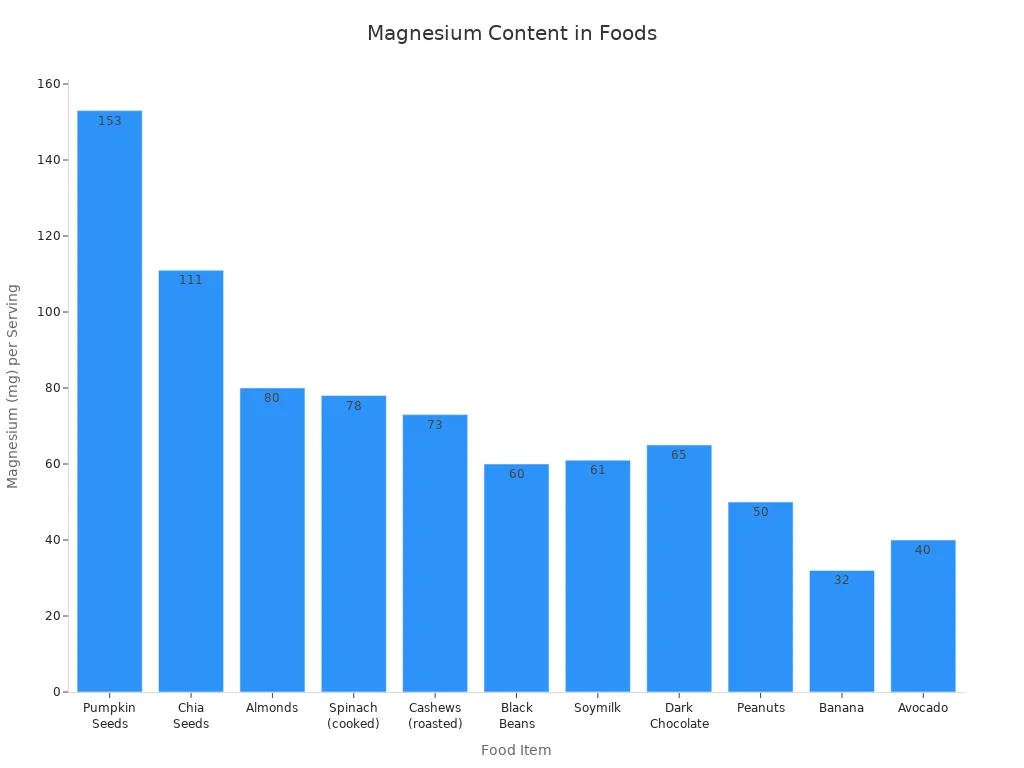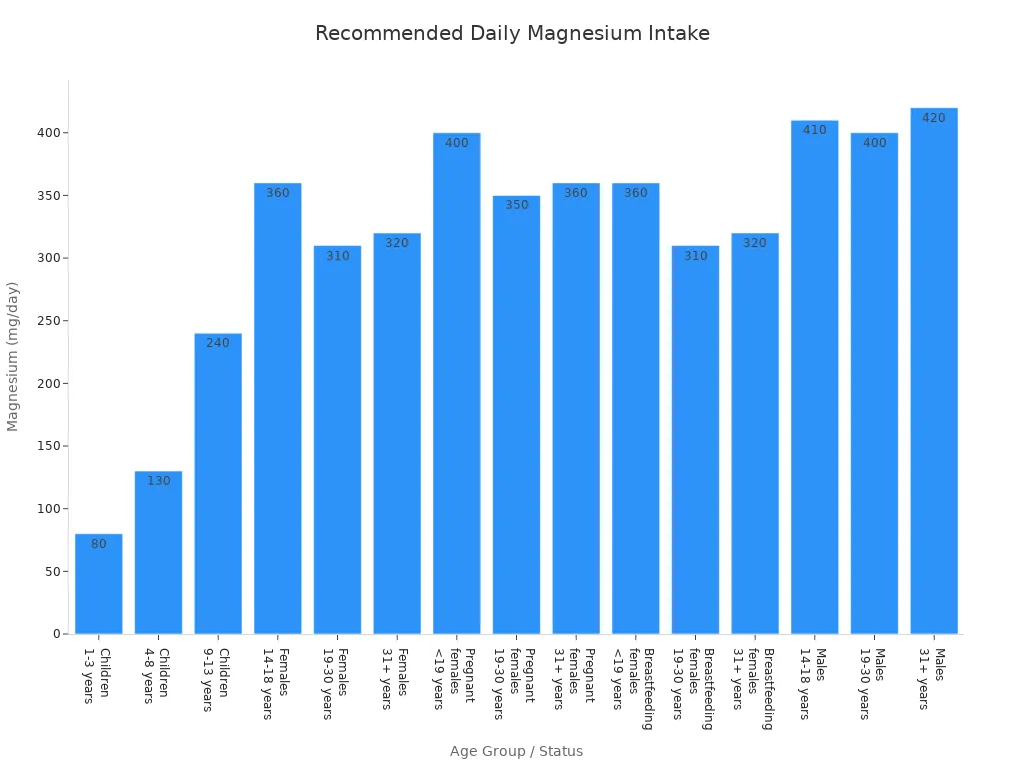Why Choose Magnesium 3 in 1 Supplement for Better Health
Table of Contents

Magnesium 3 in 1 supplements combine glycinate, citrate, and malate to provide comprehensive support for your health, highlighting the many benefits of magnesium. Each form offers unique benefits of magnesium: magnesium glycinate supports heart health, improves sleep quality, helps regulate blood sugar, and promotes mental calmness. Magnesium citrate enhances digestion and regularity. This essential mineral plays a vital role in keeping your body energized and maintaining strong bones. Many adults experience magnesium deficiency, with nearly half not meeting their daily magnesium needs. Consider the benefits of magnesium in your daily routine—are you getting enough magnesium to support better sleep, increased energy, and mental calm?
- Benefits of magnesium include:
- Supporting heart health
- Improving sleep quality
- Managing blood sugar
- Relieving muscle soreness
- Reducing stress and anxiety
What Is Magnesium 3 in 1?
Three Magnesium Types
Magnesium 3 in 1 delivers a powerful blend of three magnesium forms: glycinate, citrate, and malate. Each type has a unique function in your body. Magnesium glycinate helps you relax your muscles, sleep better, and feel less anxious. Magnesium citrate supports your digestive function, making it easier for you to stay regular and maintain bone health. Magnesium malate boosts your energy function and is gentle on your stomach. You get 1800mg of magnesium compounds in every serving, including 1000mg of glycinate, 400mg of malate, and 400mg of citrate. This combination gives you 384mg of elemental magnesium, which your body can use for many important functions.
Tip: Choosing a supplement with all three forms means you support muscle function, digestive function, and energy function at the same time.
Here’s a quick look at how each magnesium type supports your health:
| Magnesium Form | Key Function in Your Body | Extra Benefits |
|---|---|---|
| Glycinate | Muscle relaxation, sleep function | Calms your mind, gentle on stomach |
| Citrate | Digestive function, bone function | Relieves constipation, supports bones |
| Malate | Energy function, absorption function | Fewer digestive side effects |
How It Works
Magnesium 3 in 1 works by combining three highly bioavailable forms. Your body absorbs magnesium glycinate easily, so you get calming effects without stomach upset. Magnesium citrate draws water into your intestines, helping your digestive function and keeping you regular. Magnesium malate supports your energy function and is absorbed quickly, so you feel the benefits faster. When you use magnesium supplements with all three forms, you maximize absorption and support every major function that magnesium controls.
Magnesium supplements with this blend avoid fillers and use plant-based capsules, so you get pure magnesium for your body’s function. Most magnesium supplements only offer one form, which may not cover all your needs. Magnesium 3 in 1 gives you broad support for sleep function, muscle function, digestive function, and energy function. You get better results because your body can use magnesium for every function it needs.
If you want to feel more energized, sleep better, and support your digestion, magnesium 3 in 1 is the smart choice. You help your body use magnesium for every function, every day.
Benefits of Magnesium

Heart and Muscle Support
You want your heart and muscles to work their best every day. Magnesium 3 in 1 gives you strong support for both. When you take magnesium, you help your heart keep a steady rhythm and lower your risk of heart problems. A large clinical trial followed people for 10 years and found that those with higher magnesium levels had fewer heart issues, like arrhythmias and sudden heart attacks. Magnesium also helps your heart’s electrical system stay balanced, which is important for people with heart conditions. If you have low magnesium, you might face more heart risks.
Your muscles need magnesium to relax after exercise or daily activity. While some studies show that magnesium alone may not build muscle, it still helps your muscles recover and reduces cramps. You get the most benefits when you eat magnesium-rich foods, such as nuts and whole grains, along with your supplement. Magnesium 3 in 1 supports your muscles and heart together, so you feel stronger and more active.
Note: Magnesium is essential for heart rhythm and muscle relaxation. You support your body’s natural balance when you choose a high-quality supplement.
Sleep and Mental Calm
You deserve restful sleep and a calm mind. Magnesium 3 in 1 can help you achieve both. Many studies show that magnesium improves sleep quality, helps you fall asleep faster, and lets you wake up feeling refreshed. People who take magnesium often report less stress and anxiety. If you struggle with sleep or feel anxious, magnesium for anxiety and magnesium and sleep can make a real difference.
- Magnesium helps you relax at night, so you sleep longer and deeper.
- It calms your nervous system, which lowers stress and anxiety.
- People with low magnesium often feel more anxious or have trouble sleeping.
- Magnesium supports your cognitive health by helping your brain relax and focus.
- You can enjoy better mood and mental calm with regular magnesium use.
Magnesium acts on your brain’s calming pathways. It blocks signals that make you feel tense and supports the release of chemicals that help you relax. This is why magnesium benefits your sleep and mental health. If you want to boost your cognitive function and memory, magnesium 3 in 1 is a smart choice.
Energy and Digestion
You need energy to get through your busy day. Magnesium 3 in 1 powers your body’s energy production. It helps your cells make ATP, the main fuel for your muscles and brain. Magnesium is a cofactor for over 300 enzymes, so it keeps your metabolism running smoothly. You feel more alert and ready to take on challenges when your magnesium levels are healthy.
| Role Area | How Magnesium Helps You |
|---|---|
| Energy Production | Supports over 300 reactions, including ATP generation and protein synthesis, so you feel energized. |
| Digestive Health | Helps your body digest fats and proteins, keeps your gut regular, and supports healthy blood sugar levels. |
| Additional Benefits | Low magnesium links to poor health, so keeping your levels up supports your whole body. |
Magnesium also keeps your digestion on track. It helps your intestines move waste smoothly, so you avoid constipation. You also get support for blood sugar regulation, which is important for lasting energy and metabolic health. If you want to feel your best, magnesium 3 in 1 gives you the benefits you need for both energy and digestion.
More Benefits for Your Health
Magnesium 3 in 1 offers even more. If you suffer from migraines, magnesium for migraines can help prevent attacks and ease pain. Doctors recommend magnesium for migraine prevention, especially for people with aura or menstrual migraines. You also support your bones, as magnesium is key for bone health. When you keep your magnesium levels up, you protect your bones and lower your risk of osteoporosis.
The benefits of magnesium go beyond the basics. You support your heart, muscles, sleep, cognitive function, and digestion. You also help your body manage blood sugar, prevent migraines, and keep your bones strong. Magnesium threonate, a special form of magnesium, is known for its cognitive benefits and supports your memory and brain health. When you choose magnesium 3 in 1, you get a complete package of magnesium benefits for your whole body.
Magnesium in Diet vs. Supplements

Dietary Sources
You can find magnesium in many healthy foods. Seeds, nuts, leafy greens, beans, and even dark chocolate give your body a natural boost. Eating a variety of these foods helps you meet your daily needs. Here’s a quick look at some of the best sources:
| Food Item | Typical Magnesium Content per Serving |
|---|---|
| Pumpkin Seeds | 150-156 mg per 1-ounce serving |
| Chia Seeds | 111 mg per 1-ounce serving |
| Almonds | 80 mg per 1-ounce serving |
| Spinach (cooked) | 78 mg per half-cup serving |
| Cashews (roasted) | 72-74 mg per 1-ounce serving |
| Black Beans | 60 mg per half-cup serving |
| Soymilk | 61 mg per 1-cup serving |
| Dark Chocolate | 64-65 mg per 1-ounce serving |
| Peanuts | 48-51 mg per 1-ounce serving |
| Banana | 32 mg per medium banana |
| Avocado | 22-58 mg per half-cup to whole avocado serving |

Most people need about 300-350 mg of magnesium each day. Even if you eat well, you might not get enough. Many people in the United States, United Kingdom, and other countries fall short of the recommended amount. Processed foods and modern farming have lowered the magnesium content in what you eat. The Western diet, high in processed foods, leads to magnesium deficiency in up to 60% of adults.
Why Supplement?
You may wonder why magnesium deficiency is so common. Several factors make it hard to get enough, even with a balanced diet:
- Digestive problems like Crohn’s disease or celiac disease lower absorption.
- Diabetes and kidney issues cause your body to lose more magnesium.
- Some medicines, such as diuretics and acid reducers, waste magnesium.
- Stress, aging, and alcohol use reduce absorption or increase loss.
- Modern food processing removes much of the magnesium from grains and vegetables.
Your body absorbs only 20% to 50% of magnesium from food. Some forms, like magnesium oxide, have even lower absorption rates. If you are an athlete, older adult, or have certain health conditions, you may need more magnesium than food alone can provide. Studies show that magnesium supplements help athletes improve strength and recovery. Older adults benefit from better sleep and stronger bones. People with migraines, anxiety, or chronic stress often need extra support.
Tip: If you feel tired, have muscle cramps, or struggle with sleep, you could have magnesium deficiency. A high-quality supplement can help fill the gap and support your health.
You can boost your intake by eating more seeds, nuts, beans, and leafy greens. If you still fall short, a magnesium supplement gives you reliable support. Always talk to your doctor before starting any new supplement, especially if you have health concerns.
Safety and Usage
Dosage Tips
You want to get the most out of magnesium for your health. The right dose depends on your age, gender, and life stage. Men usually need more magnesium than women. Pregnant and breastfeeding women need extra magnesium to support their bodies and their babies. Athletes and older adults may need higher amounts because they lose magnesium through sweat or have trouble absorbing it.
Check the table below for recommended daily magnesium intake:
| Age Group / Status | Recommended Daily Magnesium Intake (mg) |
|---|---|
| Children 1-3 years | 80 mg |
| Children 4-8 years | 130 mg |
| Children 9-13 years | 240 mg |
| Females 14-18 years | 360 mg |
| Females 19-30 years | 310 mg |
| Females 31+ years | 320 mg |
| Pregnant females <19 years | 400 mg |
| Pregnant females 19-30 years | 350 mg |
| Pregnant females 31+ years | 360 mg |
| Males 14-18 years | 410 mg |
| Males 19-30 years | 400 mg |
| Males 31+ years | 420 mg |
Supplements should not exceed 350 mg of magnesium per day unless your doctor says otherwise. Magnesium threonate is popular for brain health and memory support. You can use magnesium threonate along with other forms, but always follow the recommended dose.

Tip: Spread your magnesium intake throughout the day for better absorption. Choose high-quality magnesium threonate for cognitive benefits.
Side Effects
Magnesium is safe for most people when you use the right amount. Too much magnesium can cause stomach pain, diarrhea, and nausea. Some people feel tired or weak if they take high doses. Rarely, magnesium toxicity can happen, especially if you have kidney problems. Signs include irregular heartbeat and low blood pressure.
Common side effects include:
- Diarrhea and stomach cramps
- Nausea and vomiting
- Muscle weakness and fatigue
- Low blood pressure
- Heart rhythm changes
Magnesium threonate is gentle on your stomach and less likely to cause digestive problems. If you notice side effects, lower your dose or switch to magnesium threonate. Always watch for symptoms and stop using magnesium if you feel unwell.
Consult Your Doctor
You should talk to your doctor before starting any magnesium supplement. Magnesium can interact with many medicines, such as antibiotics, blood pressure drugs, and diabetes medications. Your doctor will help you choose the best magnesium form, like magnesium threonate, and set the right dose for your needs.
| Reason for Consulting Healthcare Provider | Explanation |
|---|---|
| Potential Drug Interactions | Magnesium can reduce absorption of antibiotics, interfere with blood pressure medications, and interact with diuretics. |
| Risk of Magnesium Toxicity | High doses can cause magnesium toxicity, especially in people with kidney problems. |
| Appropriate Dosage Determination | Supplements vary in dose; healthcare providers can recommend safe and effective amounts. |
| Quality and Bioavailability of Supplements | Providers can help select bioavailable forms like magnesium threonate and ensure supplement quality. |
Note: Always tell your doctor about all medicines and supplements you use. This helps prevent side effects and keeps your magnesium levels safe.
Magnesium threonate offers special benefits for your brain and memory. You can add magnesium threonate to your routine, but only after checking with your healthcare provider. Your doctor will guide you to the safest and most effective way to use magnesium for your health.
Choosing magnesium 3 in 1 gives you broad health support. You benefit from three highly absorbable forms, which help your heart, bones, energy, and mental calm. Clinical studies show magnesium can lower blood pressure, improve insulin sensitivity, and reduce migraines. You get gentle absorption and fewer digestive issues. Always check the dose and purity, and talk to your doctor before starting magnesium. You deserve better sleep, stronger bones, and lasting energy. Make magnesium 3 in 1 part of your daily routine for complete wellness.
You take control of your health when you choose magnesium 3 in 1. Feel the difference every day.
FAQ
What makes Magnesium 3 in 1 better than single-form magnesium?
You get more benefits with Magnesium 3 in 1. Each form supports a different part of your health. You absorb it better. You feel stronger, sleep deeper, and stay regular. Choose this blend for complete support.
Can you take Magnesium 3 in 1 every day?
Yes, you can take it daily. Most people need magnesium every day for energy, sleep, and muscle health. Always follow the label instructions. For best results, talk to your doctor first.
Will Magnesium 3 in 1 help with stress and sleep?
Absolutely! Magnesium 3 in 1 calms your mind and relaxes your muscles. You fall asleep faster and wake up refreshed. You feel less stressed and more focused. Try it at night for the best effect.
Are there any foods you should avoid while taking magnesium supplements?
You do not need to avoid any foods. However, high-fiber foods or calcium-rich meals may slow absorption. Take your supplement with water for the best results.
How soon will you notice results from Magnesium 3 in 1?
Many people feel better within a week. You may sleep better, feel less tense, and have more energy. Results vary. Stay consistent and give your body time to adjust.

Poseidon
Master of Nutritional Epidemiology, University of Copenhagen, Herbal Functional Nutrition Researcher
Focus: The scientific application of natural active ingredients such as Tongo Ali, Horny Goat Weed, and Maca to sexual health and metabolic regulation.
Core Focus:
Men: Use a combination of Tongo Ali (an energizing factor) + Maca (an energy reserve) to improve low energy and fluctuating libido.
Women: Use a combination of Horny Goat Weed (a gentle regulator) + Maca (a nutritional synergist) to alleviate low libido and hormonal imbalances.
Stressed/Middle-Aged Adults: This triple-ingredient synergy supports metabolism, physical strength, and intimacy.
Product Concept:
Based on traditional applications and modern research (e.g., Tongo Ali promotes testosterone-enhancing enzyme activity, and icariin provides gentle regulation), we preserve core active ingredients and eschew conceptual packaging—using natural ingredients to address specific needs.
Simply put: I'm a nutritionist who understands "herbal actives." I use scientifically proven ingredients like Tongo Ali, Epimedium, and Maca to help you make "sexual health" and "nutritional support" a daily routine.
